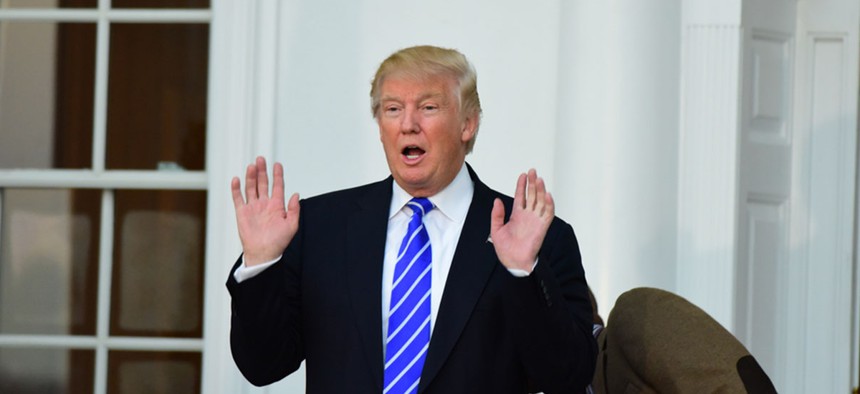
a katz / Shutterstock.com
How Will the Public Learn About Cyberattacks Under President Trump?
Unlike his predecessor, the president-elect doesn’t seem to trust the intelligence community to investigate state-sponsored hackers.
Last week, President Obama ordered the intelligence community to perform a “full review” of election-related cyberattacks. One of the president’s top advisors said the intelligence community will decide what information can be disclosed—but key members of Congress from both parties have called for the release of as much intelligence as possible about Russia’s attempts to influence the election.
The administration says it will share the results of the review with top lawmakers. Many have already emphasized the need for transparency, like the entire Democratic roster of the Senate Intelligence Community, and a bipartisan group of senators that included incoming Democratic Majority Leader Chuck Schumer and John McCain, the chair of the Senate Armed Services Committee. Those members will have some latitude to publish declassified information unearthed by the investigation.
If the review proceeds according to schedule, members of Congress should receive the results of the review before January 20, the final day of Obama’s second term. The president’s request for a quick turnaround may be a result of a desire to wrap up the investigation on his own watch, and to leave his name on a report that will likely determine cybersecurity standards around elections for years to come. The administration may also be worried about what might happen to an unfinished investigation once President-elect Donald Trump is sworn into office.
There is reason to worry. Trump has repeatedly cast doubt on the integrity of the intelligence community’s investigative work, and has questioned the neutrality of the agencies’ conclusions. “I think it’s ridiculous,” he said on Fox News Sunday, of reports that the CIA determined that Russia used hacking to try and tilt the election in his favor. “I think it's just another excuse. I don't believe it.” Earlier this week, he told Time he thinks the intelligence community’s determinations were politically motivated.
Trump has also decided not to attend some of the daily intelligence briefings that traditionally help presidents-elect get up to speed with sensitive national-security issues before they take office. “I'm, like, a smart person,” he said Sunday when Fox’s Chris Wallace asked him why he wasn’t attending the briefings every day, complaining that the briefings were too repetitive. “I don’t need to be told, Chris, the same thing every day, every morning, same words. ‘Sir, nothing has changed. Let’s go over it again.’ I don't need that.”
Kellyanne Conway, a top advisor to Trump, told Face the Nation that Trump “will not interfere in the legislative branch” if Congress were to conduct investigations into Russia’s electoral meddling. She was asked whether Trump would also stay out of the way of an executive branch probe, but didn’t answer. A spokesperson for the Trump transition committee didn’t immediately answer a request for comment.
If the intelligence community doesn’t finish its investigation before January 20 and Trump decides to obstruct it, the agency and the President will find themselves in an unusual conflict. Glenn Carle, a retired CIA agent of 20 years, told the LA Times that an antagonistic relationship between the White House and the CIA would pose novel problems.
“It sets up one of the great crises in the history of the executive branch,” Carle said. “All the agency can do short of insurrection is to present the facts when allowed to the executive we serve.”
If the public is to stay informed about foreign hacking that the executive branch wanted to keep quiet, whistleblowers in the intelligence community would have to come forward to leak important findings. But under President Obama, leakers have faced steep penalties for sharing classified information with the press or the public—and Trump seems far more hostile toward transparency, as evidenced by his stances on journalism and free speech.
In the absence of official reports about hacking, the private sector would have a bigger role to play, too. Crowdstrike, an American cybersecurity company, helped the Democratic National Committee investigate the data breach that led to the leak of tens of thousands of emails and documents. The company publicly shared its findings—that the intrusion originated in Russia—in June, a month after it discovered the breach.
For the past four years, Obama’s Justice Department has showed a willingness to name and shame state sponsors of hacking. In 2012, it placed five Chinese criminals on its “cyber most-wanted” list; since then, it’s added hackers from Iran, Syria, Russia, and elsewhere, bringing a measure of transparency to the inner workings of state-sponsored cybercrime.
But too much transparency might prove an inconvenience for a President-elect who downplays the ability of U.S. intelligence to accurately attribute foreign cyberattacks—and who wants to avoid dwelling on Russia’s hacking activity. The review that Obama ordered may be the last the public hears about foreign hacking for some time.







